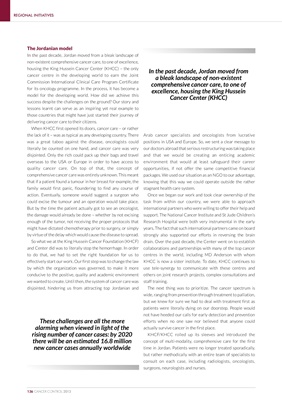
REGIONAL INITIATIVES
The Jordanian model
In the past decade, Jordan moved from a bleak landscape of
non-existent comprehensive cancer care, to one of excellence,
housing the King Hussein Cancer Center (KHCC) – the only
In the past decade, Jordan moved from
cancer centre in the developing world to earn the Joint
a bleak landscape of non-existent
Commission International Clinical Care Program Certificate
comprehensive cancer care, to one of
for its oncology programme. In the process, it has become a
excellence, housing the King Hussein
model for the developing world. How did we achieve this
Cancer Center (KHCC)
success despite the challenges on the ground? Our story and
lessons learnt can serve as an inspiring yet real example to
those countries that might have just started their journey of
delivering cancer care to their citizens.
When KHCC first opened its doors, cancer care – or rather
the lack of it – was as typical as any developing country. There Arab cancer specialists and oncologists from lucrative
was a great taboo against the disease, oncologists could positions in USA and Europe. So, we sent a clear message to
literally be counted on one hand, and cancer care was very our doctors abroad that serious restructuring was taking place
disjointed. Only the rich could pack up their bags and travel and that we would be creating an enticing academic
overseas to the USA or Europe in order to have access to environment that would at least safeguard their career
quality cancer care. On top of that, the concept of opportunities, if not offer the same competitive financial
comprehensive cancer care was entirely unknown. This meant packages. We used our situation as an NGO to our advantage,
that if a patient found a tumour in her breast for example, the knowing that this way we could operate outside the rather
family would first panic, floundering to find any course of stagnant health care system.
action. Eventually, someone would suggest a surgeon who Once we began our work and took clear ownership of the
could excise the tumour and an operation would take place. task from within our country, we were able to approach
But by the time the patient actually got to see an oncologist, international partners who were willing to offer their help and
the damage would already be done – whether by not excising support. The National Cancer Institute and St Jude Children’s
enough of the tumor, not receiving the proper protocols that Research Hospital were both very instrumental in the early
might have dictated chemotherapy prior to surgery, or simply years. The fact that such international partners came on board
by virtue of the delay which would cause the disease to spread. strongly also supported our efforts in reversing the brain
So what we at the King Hussein Cancer Foundation (KHCF) drain. Over the past decade, the Center went on to establish
and Center did was to literally stop the hemorrhage. In order collaborations and partnerships with many of the top cancer
to do that, we had to set the right foundation for us to centres in the world, including MD Anderson with whom
effectively start our work. Our first step was to change the law KHCC is now a sister institute. To date, KHCC continues to
by which the organization was governed, to make it more use tele-synergy to communicate with these centres and
conducive to the positive, quality and academic environment others on joint research projects, complex consultations and
we wanted to create. Until then, the system of cancer care was staff training.
disjointed, hindering us from attracting top Jordanian and The next thing was to prioritize. The cancer spectrum is
wide, ranging from prevention through treatment to palliation,
but we knew for sure we had to deal with treatment first as
patients were literally dying on our doorstep. People would
not have heeded our calls for early detection and prevention
These challenges are all the more efforts when no one saw nor believed that anyone could
alarming when viewed in light of the actually survive cancer in the first place.
rising number of cancer cases: by 2020 KHCF/KHCC rolled up its sleeves and introduced the
there will be an estimated 16.8 million concept of multi-modality, comprehensive care for the first
new cancer cases annually worldwide time in Jordan. Patients were no longer treated sporadically,
but rather methodically with an entire team of specialists to
consult on each case, including radiologists, oncologists,
surgeons, neurologists and nurses.
136 CANCER CONTROL 2013